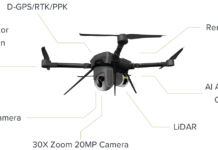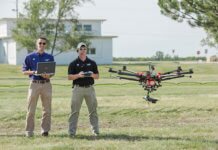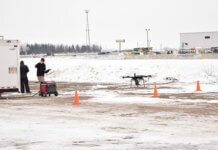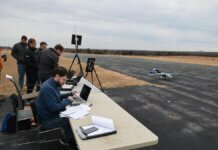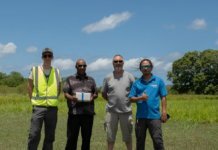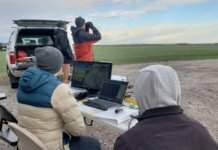Virginia Tech’s Unmanned Systems Laboratory recently teamed up with the Malawi University of Science and Technology (MUST) to build and test delivery drones in sub-Saharan Africa at the UNICEF drone testing corridor.
Designed to carry small packages for medical supplies and diagnostics, the EcoSoar drone achieved a milestone Nov. 9 when it flew a 19-kilometer, fully autonomous mission from the Gogode Health Clinic to the Kasungu Airport.
The drones were built by a team of Malawian students from MUST under the supervision of Virginia Tech graduate students Zack Standridge in aerospace engineering and James Donnelly of mechanical engineering, along with Kevin Kochersberger, an associate professor in mechanical engineering.
Thirteen students from across Malawi built five EcoSoar aircraft as part of a two-day fabrication workshop. After a day of flight testing, hundreds of villagers came to the airfield to witness the beyond-line-of-sight flight. The $350 aircraft, which carried a simulated package of dried blood spot samples to the airport, was made with materials such as foamcore poster board and 3D-printed parts, says Virginia Tech.
“EcoSoar was designed with low-resource environments in mind,” says Kochersberger. “I envision entrepreneurs in Malawi establishing businesses around the use of this aircraft – building, operating and maintaining EcoSoar for both medical deliveries and environmental assessment activities.”
In addition to a payload capacity of 130 grams (4.5 ounces), the aircraft can be fitted with an eight-megapixel camera to collect images of the ground environment. The imagery can then be used for environmental monitoring.
Donnelly launched the aircraft from the Gogode Health Clinic, and Standridge stood by to recover it at the Kasungu Airport.
“It is extremely rewarding to see my design successfully recreated, and seeing the local students’ excitement in their work only adds to my own enthusiasm for the project,” Standridge says.
The UNICEF drone testing corridor opened in the summer through a partnership with the Malawian government to explore drone applications in emergency medical supply delivery, vaccine and sample delivery for diagnosis, and remote sensing for environmental assessment. It will remain open for one to two years.
“It was truly inspiring to see a Malawi-manufactured drone built only by students under Virginia Tech guidance,” says Michael Scheibenreif, UNICEF’s drone corridor lead, who was on-site for the flight.


